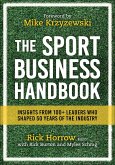- Loseblattsammlung
- Merkliste
- Auf die Merkliste
- Bewerten Bewerten
- Teilen
- Produkt teilen
- Produkterinnerung
- Produkterinnerung
Organized around the management functions of planning, organizing, leading, and controlling, Applied Sport Management Skills, Fourth Edition, prepares students to become strong leaders and managers in the world of sport. Students learn management theory and how to apply and develop skills in sport contexts.
Andere Kunden interessierten sich auch für
![Managing Sport Facilities Managing Sport Facilities]() Gil FriedManaging Sport Facilities119,99 €
Gil FriedManaging Sport Facilities119,99 €![Orchestra Management in Practice Orchestra Management in Practice]() Salvino A. SalvaggioOrchestra Management in Practice58,99 €
Salvino A. SalvaggioOrchestra Management in Practice58,99 €![Sport Finance Sport Finance]() Gil FriedSport Finance109,99 €
Gil FriedSport Finance109,99 €![The Sport Business Handbook The Sport Business Handbook]() The Sport Business Handbook40,99 €
The Sport Business Handbook40,99 €![Sport Public Relations Sport Public Relations]() G. Clayton StoldtSport Public Relations104,99 €
G. Clayton StoldtSport Public Relations104,99 €![The Political Economy of the Creative and Cultural Industries The Political Economy of the Creative and Cultural Industries]() Leandro ValiatiThe Political Economy of the Creative and Cultural Industries78,99 €
Leandro ValiatiThe Political Economy of the Creative and Cultural Industries78,99 €![Risk Management for Events Risk Management for Events]() Julia Rutherford SilversRisk Management for Events72,99 €
Julia Rutherford SilversRisk Management for Events72,99 €-
-
-
Organized around the management functions of planning, organizing, leading, and controlling, Applied Sport Management Skills, Fourth Edition, prepares students to become strong leaders and managers in the world of sport. Students learn management theory and how to apply and develop skills in sport contexts.
Hinweis: Dieser Artikel kann nur an eine deutsche Lieferadresse ausgeliefert werden.
Hinweis: Dieser Artikel kann nur an eine deutsche Lieferadresse ausgeliefert werden.
Produktdetails
- Produktdetails
- Verlag: Human Kinetics Publishers
- Fourth Edition
- Seitenzahl: 544
- Erscheinungstermin: 6. März 2023
- Englisch
- Abmessung: 221mm x 284mm x 28mm
- Gewicht: 1468g
- ISBN-13: 9781718219908
- ISBN-10: 1718219903
- Artikelnr.: 66222889
- Herstellerkennzeichnung
- Libri GmbH
- Europaallee 1
- 36244 Bad Hersfeld
- gpsr@libri.de
- Verlag: Human Kinetics Publishers
- Fourth Edition
- Seitenzahl: 544
- Erscheinungstermin: 6. März 2023
- Englisch
- Abmessung: 221mm x 284mm x 28mm
- Gewicht: 1468g
- ISBN-13: 9781718219908
- ISBN-10: 1718219903
- Artikelnr.: 66222889
- Herstellerkennzeichnung
- Libri GmbH
- Europaallee 1
- 36244 Bad Hersfeld
- gpsr@libri.de
Robert N. Lussier, PhD, is a professor emeritus of management at the birthplace of basketball, Springfield College, where more than one-third of the students compete in intercollegiate athletic teams. He has taught undergraduate and graduate sport management students for more than 30 years. He has also supervised sport internships and serves as an advisor for sport management research projects. Lussier was an intercollegiate cross country and track athlete and has coached at the college, high school, and youth levels. He is a prolific writer with more than 500 publications, including articles in top refereed journals, with more than 11,000 Google Scholar citations. Over two million people globally have used his textbooks, earning him an unsurpassed national and international reputation as an author. Dr. Lussier is the founder of Publish Don’t Perish (www.publishdonotperish.com). Through his book Publish Don’t Perish: The Top Secrets to Get Published and workshops, he has helped hundreds of institutions and individuals in more than 80 countries get published. Dr. Lussier also provides consulting services to a wide array of commercial and nonprofit organizations. In fact, some of the material in the book was developed for such clients as Baystate Medical Center, Coca-Cola, Friendly’s, National Institute of Financial Education, Mead, Monsanto, Smith & Wesson, the Social Security Administration, the Visiting Nurse Association, and YMCAs. Dr. Lussier holds a bachelor of science in business administration from Salem State College, master’s degrees in business and education from Suffolk University, and a doctorate in management from the University of New Haven. David C. Kimball, PhD, is a professor of management and the director of the sport management program at Elms College. He teaches sport management and sport marketing courses. As coordinator of the sport management internship program, he has placed many students in internships that offer real-world experience. Kimball has helped develop and promote sporting events for organizations such as Junior Achievement and the JCC Maccabi Games, and he coaches and supervises Maccabi athletes each summer. He has an expansive network of friends and acquaintances in the sport management field; many of the case studies in this book arose from these relationships.
Part I. Introduction to Sport Management
Chapter 1. Managing Sports
Why Study Sport Management?
The Sport Industry and Sport Management
Sport Manager's Responsibilities
What Does It Take to Be a Successful Manager?
What Do Sport Managers Do?
How Do Managers Differ?
Learning Aids
Chapter 2. The Sport Industry Environment: Globalization, Ethics, and
Social Responsibility
Internal Environment and Quality in Sport
External Environment
Conducting Sport Business in a Global Environment
Ethics in Sport Management
Why Good People Use Unethical Behavior
Guides to Ethical Behavior and Managing Ethics
Social Responsibility and Sustainability
Learning Aids
Part II. Planning
Chapter 3. Creative Problem Solving and Decision Making
An Overview of Problem Solving and Decision Making
Step 1: Define the Problem or Opportunity
Step 2: Set Objectives and Criteria
Step 3: Generate Alternatives
Step 4: Select the Most Feasible Alternative
Step 5: Plan and Implement the Decision
Step 6: Control the Results
Learning Aids
Chapter 4. Strategic and Operational Planning
An Overview of Strategic and Operational Planning
Strategic Process
Analysis of the Environment
Setting of Objectives
Corporate-Level Strategy
Business-Level Strategy
Operational-Level Strategies
Implementing and Controlling the Strategies
Learning Aids
Part III. Organizing
Chapter 5. Organizing and Delegating Work
The Organizing Function
Authority
Organizational Design
Job Design
Organizing Yourself and Delegating Work
Learning Aids
Chapter 6. Managing Change, Culture, Innovation, and Diversity
Managing Change
Organizational Culture
Innovation and Quality
Diversity, Equity, and Inclusion (DE&I)
Diversity Groups and Sports
Organizational Development
Learning Aids
Chapter 7. Human Resources Management
Human Resources Management Process and Department
Legal Environment
Human Resources Planning and Job Design
Attracting Employees
Interviewing
Developing Employees
Performance Appraisals
Retaining Employees
Learning Aids
Part IV. Leading
Chapter 8. Behavior in Organizations: Power, Politics, Conflict, and Stress
Organizational Behavior and Thoughts
Personality
Perception
Attitude Formation and Behavior
Power
Politics in the Office and on the Field
Managing Conflict
Negotiation
Collaboration Conflict Skills
Stress
Learning Aids
Chapter 9. Team Development
Importance of Teamwork to Performance
Group Performance Model
Group Structure
Group Process
Stages of Group Development and Leadership Styles
Getting to Better Meetings
Learning Aids
Chapter 10. Communicating for Results
Understanding the Importance of Good Communication
Using Organizational Communication
Using Interpersonal Communication
Using the Channels
Sending Messages
Receiving Messages
Responding to Messages
Dealing With Emotions and Criticism
Learning Aids
Chapter 11. Motivating to Win
Motivation and Performance
Content-Based Motivation Theories
Process-Based Motivation Theories
Reinforcement Theory
Putting Theory to Work Within the Motivational Process and Motivating
Yourself
Learning Aids
Chapter 12. Leading to Victory
Leadership
Behavior of Effective Leaders
Contemporary Behavioral Perspectives
Situational Leadership Theories and Models
Getting to Your Personal Style of Leadership
Learning Aids
Part V. Controlling
Chapter 13. Controlling Quality, Financials, Productivity and Managing
People
Quality and Control Systems
Control Process
Frequency of Controls
Financial Controls
Managing People
Managing Problem Employees
Productivity
Learning Aids
Chapter 14. Facilities and Events Management
Sport Facilities and Event Management
Sport Facilities Management
Sport Event Management
Planning and Controlling Sports
Sales Forecasting Techniques
Scheduling Tools
Time Management
Learning Aids
Afterword: The Future of Sport Management
Appendix: Careers in Sport Management
Chapter 1. Managing Sports
Why Study Sport Management?
The Sport Industry and Sport Management
Sport Manager's Responsibilities
What Does It Take to Be a Successful Manager?
What Do Sport Managers Do?
How Do Managers Differ?
Learning Aids
Chapter 2. The Sport Industry Environment: Globalization, Ethics, and
Social Responsibility
Internal Environment and Quality in Sport
External Environment
Conducting Sport Business in a Global Environment
Ethics in Sport Management
Why Good People Use Unethical Behavior
Guides to Ethical Behavior and Managing Ethics
Social Responsibility and Sustainability
Learning Aids
Part II. Planning
Chapter 3. Creative Problem Solving and Decision Making
An Overview of Problem Solving and Decision Making
Step 1: Define the Problem or Opportunity
Step 2: Set Objectives and Criteria
Step 3: Generate Alternatives
Step 4: Select the Most Feasible Alternative
Step 5: Plan and Implement the Decision
Step 6: Control the Results
Learning Aids
Chapter 4. Strategic and Operational Planning
An Overview of Strategic and Operational Planning
Strategic Process
Analysis of the Environment
Setting of Objectives
Corporate-Level Strategy
Business-Level Strategy
Operational-Level Strategies
Implementing and Controlling the Strategies
Learning Aids
Part III. Organizing
Chapter 5. Organizing and Delegating Work
The Organizing Function
Authority
Organizational Design
Job Design
Organizing Yourself and Delegating Work
Learning Aids
Chapter 6. Managing Change, Culture, Innovation, and Diversity
Managing Change
Organizational Culture
Innovation and Quality
Diversity, Equity, and Inclusion (DE&I)
Diversity Groups and Sports
Organizational Development
Learning Aids
Chapter 7. Human Resources Management
Human Resources Management Process and Department
Legal Environment
Human Resources Planning and Job Design
Attracting Employees
Interviewing
Developing Employees
Performance Appraisals
Retaining Employees
Learning Aids
Part IV. Leading
Chapter 8. Behavior in Organizations: Power, Politics, Conflict, and Stress
Organizational Behavior and Thoughts
Personality
Perception
Attitude Formation and Behavior
Power
Politics in the Office and on the Field
Managing Conflict
Negotiation
Collaboration Conflict Skills
Stress
Learning Aids
Chapter 9. Team Development
Importance of Teamwork to Performance
Group Performance Model
Group Structure
Group Process
Stages of Group Development and Leadership Styles
Getting to Better Meetings
Learning Aids
Chapter 10. Communicating for Results
Understanding the Importance of Good Communication
Using Organizational Communication
Using Interpersonal Communication
Using the Channels
Sending Messages
Receiving Messages
Responding to Messages
Dealing With Emotions and Criticism
Learning Aids
Chapter 11. Motivating to Win
Motivation and Performance
Content-Based Motivation Theories
Process-Based Motivation Theories
Reinforcement Theory
Putting Theory to Work Within the Motivational Process and Motivating
Yourself
Learning Aids
Chapter 12. Leading to Victory
Leadership
Behavior of Effective Leaders
Contemporary Behavioral Perspectives
Situational Leadership Theories and Models
Getting to Your Personal Style of Leadership
Learning Aids
Part V. Controlling
Chapter 13. Controlling Quality, Financials, Productivity and Managing
People
Quality and Control Systems
Control Process
Frequency of Controls
Financial Controls
Managing People
Managing Problem Employees
Productivity
Learning Aids
Chapter 14. Facilities and Events Management
Sport Facilities and Event Management
Sport Facilities Management
Sport Event Management
Planning and Controlling Sports
Sales Forecasting Techniques
Scheduling Tools
Time Management
Learning Aids
Afterword: The Future of Sport Management
Appendix: Careers in Sport Management
Part I. Introduction to Sport Management
Chapter 1. Managing Sports
Why Study Sport Management?
The Sport Industry and Sport Management
Sport Manager's Responsibilities
What Does It Take to Be a Successful Manager?
What Do Sport Managers Do?
How Do Managers Differ?
Learning Aids
Chapter 2. The Sport Industry Environment: Globalization, Ethics, and
Social Responsibility
Internal Environment and Quality in Sport
External Environment
Conducting Sport Business in a Global Environment
Ethics in Sport Management
Why Good People Use Unethical Behavior
Guides to Ethical Behavior and Managing Ethics
Social Responsibility and Sustainability
Learning Aids
Part II. Planning
Chapter 3. Creative Problem Solving and Decision Making
An Overview of Problem Solving and Decision Making
Step 1: Define the Problem or Opportunity
Step 2: Set Objectives and Criteria
Step 3: Generate Alternatives
Step 4: Select the Most Feasible Alternative
Step 5: Plan and Implement the Decision
Step 6: Control the Results
Learning Aids
Chapter 4. Strategic and Operational Planning
An Overview of Strategic and Operational Planning
Strategic Process
Analysis of the Environment
Setting of Objectives
Corporate-Level Strategy
Business-Level Strategy
Operational-Level Strategies
Implementing and Controlling the Strategies
Learning Aids
Part III. Organizing
Chapter 5. Organizing and Delegating Work
The Organizing Function
Authority
Organizational Design
Job Design
Organizing Yourself and Delegating Work
Learning Aids
Chapter 6. Managing Change, Culture, Innovation, and Diversity
Managing Change
Organizational Culture
Innovation and Quality
Diversity, Equity, and Inclusion (DE&I)
Diversity Groups and Sports
Organizational Development
Learning Aids
Chapter 7. Human Resources Management
Human Resources Management Process and Department
Legal Environment
Human Resources Planning and Job Design
Attracting Employees
Interviewing
Developing Employees
Performance Appraisals
Retaining Employees
Learning Aids
Part IV. Leading
Chapter 8. Behavior in Organizations: Power, Politics, Conflict, and Stress
Organizational Behavior and Thoughts
Personality
Perception
Attitude Formation and Behavior
Power
Politics in the Office and on the Field
Managing Conflict
Negotiation
Collaboration Conflict Skills
Stress
Learning Aids
Chapter 9. Team Development
Importance of Teamwork to Performance
Group Performance Model
Group Structure
Group Process
Stages of Group Development and Leadership Styles
Getting to Better Meetings
Learning Aids
Chapter 10. Communicating for Results
Understanding the Importance of Good Communication
Using Organizational Communication
Using Interpersonal Communication
Using the Channels
Sending Messages
Receiving Messages
Responding to Messages
Dealing With Emotions and Criticism
Learning Aids
Chapter 11. Motivating to Win
Motivation and Performance
Content-Based Motivation Theories
Process-Based Motivation Theories
Reinforcement Theory
Putting Theory to Work Within the Motivational Process and Motivating
Yourself
Learning Aids
Chapter 12. Leading to Victory
Leadership
Behavior of Effective Leaders
Contemporary Behavioral Perspectives
Situational Leadership Theories and Models
Getting to Your Personal Style of Leadership
Learning Aids
Part V. Controlling
Chapter 13. Controlling Quality, Financials, Productivity and Managing
People
Quality and Control Systems
Control Process
Frequency of Controls
Financial Controls
Managing People
Managing Problem Employees
Productivity
Learning Aids
Chapter 14. Facilities and Events Management
Sport Facilities and Event Management
Sport Facilities Management
Sport Event Management
Planning and Controlling Sports
Sales Forecasting Techniques
Scheduling Tools
Time Management
Learning Aids
Afterword: The Future of Sport Management
Appendix: Careers in Sport Management
Chapter 1. Managing Sports
Why Study Sport Management?
The Sport Industry and Sport Management
Sport Manager's Responsibilities
What Does It Take to Be a Successful Manager?
What Do Sport Managers Do?
How Do Managers Differ?
Learning Aids
Chapter 2. The Sport Industry Environment: Globalization, Ethics, and
Social Responsibility
Internal Environment and Quality in Sport
External Environment
Conducting Sport Business in a Global Environment
Ethics in Sport Management
Why Good People Use Unethical Behavior
Guides to Ethical Behavior and Managing Ethics
Social Responsibility and Sustainability
Learning Aids
Part II. Planning
Chapter 3. Creative Problem Solving and Decision Making
An Overview of Problem Solving and Decision Making
Step 1: Define the Problem or Opportunity
Step 2: Set Objectives and Criteria
Step 3: Generate Alternatives
Step 4: Select the Most Feasible Alternative
Step 5: Plan and Implement the Decision
Step 6: Control the Results
Learning Aids
Chapter 4. Strategic and Operational Planning
An Overview of Strategic and Operational Planning
Strategic Process
Analysis of the Environment
Setting of Objectives
Corporate-Level Strategy
Business-Level Strategy
Operational-Level Strategies
Implementing and Controlling the Strategies
Learning Aids
Part III. Organizing
Chapter 5. Organizing and Delegating Work
The Organizing Function
Authority
Organizational Design
Job Design
Organizing Yourself and Delegating Work
Learning Aids
Chapter 6. Managing Change, Culture, Innovation, and Diversity
Managing Change
Organizational Culture
Innovation and Quality
Diversity, Equity, and Inclusion (DE&I)
Diversity Groups and Sports
Organizational Development
Learning Aids
Chapter 7. Human Resources Management
Human Resources Management Process and Department
Legal Environment
Human Resources Planning and Job Design
Attracting Employees
Interviewing
Developing Employees
Performance Appraisals
Retaining Employees
Learning Aids
Part IV. Leading
Chapter 8. Behavior in Organizations: Power, Politics, Conflict, and Stress
Organizational Behavior and Thoughts
Personality
Perception
Attitude Formation and Behavior
Power
Politics in the Office and on the Field
Managing Conflict
Negotiation
Collaboration Conflict Skills
Stress
Learning Aids
Chapter 9. Team Development
Importance of Teamwork to Performance
Group Performance Model
Group Structure
Group Process
Stages of Group Development and Leadership Styles
Getting to Better Meetings
Learning Aids
Chapter 10. Communicating for Results
Understanding the Importance of Good Communication
Using Organizational Communication
Using Interpersonal Communication
Using the Channels
Sending Messages
Receiving Messages
Responding to Messages
Dealing With Emotions and Criticism
Learning Aids
Chapter 11. Motivating to Win
Motivation and Performance
Content-Based Motivation Theories
Process-Based Motivation Theories
Reinforcement Theory
Putting Theory to Work Within the Motivational Process and Motivating
Yourself
Learning Aids
Chapter 12. Leading to Victory
Leadership
Behavior of Effective Leaders
Contemporary Behavioral Perspectives
Situational Leadership Theories and Models
Getting to Your Personal Style of Leadership
Learning Aids
Part V. Controlling
Chapter 13. Controlling Quality, Financials, Productivity and Managing
People
Quality and Control Systems
Control Process
Frequency of Controls
Financial Controls
Managing People
Managing Problem Employees
Productivity
Learning Aids
Chapter 14. Facilities and Events Management
Sport Facilities and Event Management
Sport Facilities Management
Sport Event Management
Planning and Controlling Sports
Sales Forecasting Techniques
Scheduling Tools
Time Management
Learning Aids
Afterword: The Future of Sport Management
Appendix: Careers in Sport Management








